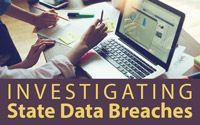Protect Yourself from Identity Theft
July 30, 2018
Protect Yourself from Identity Theft
To help keep up with the latest scams and frauds, the Office of Attorney General’s website lists advisories for consumers, tips for keeping personal information safe and news about consumer investigations. Specifically, the website offers guides for charitable giving, buying used cars, living trust scams, work-at-home schemes, telemarketing, fraudulent investment and tips for travelers. A special section – with links to brochures and in-person educational programs – is also designed for senior citizens to educate themselves about this fast-growing crime. According to the Office of Attorney General, the Commonwealth of Pennsylvania has the third highest percentage of elderly residents in the United States with nearly 2 million residents over the age of 65. Scam artist of all types take advantage of this and target this generation. To find out more, click here. |
||
| House Asks Attorney General to Investigate State Data Breaches
The House has asked the attorney general to investigate whether Pennsylvanians’ vital personal information was exposed during the Department of Health breach in late June. The attorney general has conducted several other investigations involving data breaches of Equifax, Uber, the TIO Networks, Nationwide Mutual Insurance Co., Facebook and the Target Corporation. In addition to the call for an investigation, the House passed two bills this session dealing with data security and informing the public of possible breaches. House Bill 1846 would require notice within 45 days to Pennsylvania residents when there is a breach of security in plain language and must include the date of the breach and the toll-free numbers to credit reporting agencies. House Bill 1847 would amend the Credit Reporting Agency Act to waive the current $10 fee to freeze credit reports and would provide consumers with three months of free credit monitoring following a data breach and three free credit reports for one calendar year after the breach. |
||
| Credit Card Skimming Becomes a Crime
Until Act 60 of 2018, possessing these devices was not illegal, even though they have no use other than for criminal, deceitful and deceptive purposes. Anyone convicted of using or possessing a scanning or skimming device now faces a third-degree felony for a first offense and a second-degree felony for a second or subsequent offense. This new law brings Pennsylvania in line with 30 other states that have enacted similar legislation. It takes effect in late August. |
||
| Preventing Double Taxation on Mobile Devices
Act 52 of 2018 excludes the sales of telephones, telephone handsets, modems, tablets and related accessories, including cases, chargers, holsters, clips, hands-free devices, screen protectors and batteries, from being subject to the Gross Receipts Tax. Those devices are already subject to the 6 percent Sales and Use Tax. The change is needed because the Commonwealth had not updated its definition of mobile telecommunication since 2002. During the last 16 years, communications technology has advanced, causing uncertainty about which tax better fits. The new law clarifies the definition of what is subject to the Gross Receipts Tax and is subject to the Sales and Use Tax. Updating these definitions further protects consumers from bureaucratic overreach. |
||
| Empowering Consumers with Prescription Pricing Info
Some pharmacy benefit managers (PBMs) have been cutting reimbursements to community pharmacies for medications sold to patients on Medicaid. This practice has led to substantial financial difficulties for community pharmacies, which are typically locally owned family businesses. House Bill 2212 would remedy the problem by preventing PBMs from cutting reimbursements to community pharmacies for medications sold to patients on Medicaid. Also, when PBMs contract with pharmacies, the documents may at times contain what is referred to as a “gag clause,” which prohibits pharmacists from disclosing information to a customer that could reduce their out-of-pocket costs for medications. House Bill 2211 addresses those situations by allowing pharmacists to disclose drug information, allowing consumers to get the best price for their medications. Both bills are now in the state Senate for review. |
||
| Persian Gulf Veterans Bonus Deadline is Next Month
The bonus pays $75 per month for qualifying, active-duty service members, up to a $525 maximum. For personnel whose death was related to illness or injury received in the line of duty in Operations Desert Shield or Desert Storm, an additional $5,000 is available to the surviving family. Service members who were declared prisoners of war may also be eligible for an additional $5,000. To qualify, the service member must have:
For more information about how to apply, click here. |
||
Sign Up to Receive Legislative Email Updates
Keep up-to-date on the latest legislative and community news. Your email address will be used strictly for legislative purposes.





